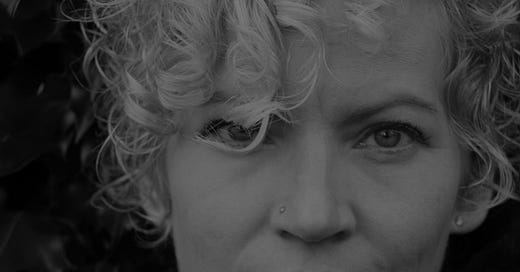Put down your phone and smell your friends
Life is not meant to be lived by one sense alone
Hello everybody,
This week we’re looking at the visual age and reacquainting ourselves with our other senses.
You can find the companion article here: The 4 “beauty ideals” that fuel everyday prejudice
My wife is sleeping with another man.
Every night, just as she rolls over to sleep, my wife turns on Stephen Fry narrating the Harry Potter books. Over the years, she’s become so accustomed to this little habit that she now has to do this to fall asleep. And so, if we ever go away somewhere and she forgets her headphones, it means we both listen to Stephen Fry. I don’t mind it so much. If I’m honest, I quite like it.
Stephen Fry has a mellifluous voice. He has a deep and gentle timbre that is reassuring and relaxing. It wouldn’t be an exaggeration to say his voice is beautiful.
Human beauty is not limited to what you see. It makes complete sense to me to describe a voice as beautiful. Voices can be beautiful in all the many ways that humans are beautiful, too. I find the Welsh accent beautiful in storytelling, the Scottish accent beautiful in conversation, and the Irish accent beautiful in song.
We don’t need to stop here because we can find beauty in our other senses, too. I find the smell of morning coffee beautiful, and when I catch the occasional passing scent of the perfume my grandma used to wear, I find it poignantly nostalgic. I even find the mucky smell of a farm beautiful in its own earthy and evocative way.
As I put it in this week’s Mini Philosophy video, “Humans were not meant to live by one sense alone. There is so much more to enjoy.” This week, we explore the “so much more.”
Multi-sensory charisma
I just came back from Lisbon. I was giving a talk about philosophy and spent most of the off-stage time surrounded by performing arts-type people. And, everyone was touching each other. I do not mean to say this was an Eyes Wide Shut-kind of Portuguese orgy, but rather that people there would hug, kiss, hold hands, and have radically different concepts of personal space compared to what I grew up with. In most conversations, people would reach out to touch your arm as a kind of conversational flourish.
When I came home and spoke to people about Lisbon, I was surprised by how deeply I felt connected with these people I’d only just met. I’d bonded with these strangers in a way that would normally take weeks or months. Of course, personalities matter. I suspect the high-adrenaline, shared-adversity nerves of talking to a room of 800 people might have mattered, too. But I was struck by how far touch makes us feel close to someone.
In this week’s interview, I spoke with the philosopher Heather Widdows about our visual culture. Widdows argues that, as a society, we place more emphasis on what we see and how things look than at any other time in human history. In part, it’s a cultural trend—these things ebb and flow throughout history—but you’ll be unsurprised to hear that it’s amplified and underscored by the rise of social media and video calls. Widdows puts it like this:
We live in a visual age. The tech is changing around us, and we are moving to a visual culture where we're nearly always being judged partly on appearance, or we're looking at people's faces and bodies in a way that we just didn't do in real life… The difference between the real and the virtual is kind of eroding. The younger you are, the harder it is to see that divide. The kind of beauty that we’re seeing surrounding thinness, firmness, smoothness, and youth is taken to extremes in the virtual world. So, you end up with wholly kind of plastic perfection images. In the real world, bodies are soft and they’re messy and they’re not hard, and interaction is far more nuanced.
As soon as you move into the two-dimensional, you don’t notice how the body moves. You don’t notice how people smell. That kind of charisma is much less obvious and can be shaped in a two-dimensional image.
I find that word “charisma” important here because charisma is something much deeper than being “attractive” or “good-looking.” Charisma is a multi-sensory experience. It involves how someone talks and what they talk about. It’s about the way they move their body and how they touch you. And yes, it even has to do with how someone smells.
In his book, Perfume: The Story of a Murderer, Patrick Süskind introduces the character Grenouille as “having no odour of his own. That is to say, he did not smell bad, nor did he smell in any way. He simply had no smell at all. He was a cipher, a vacant space; he was inconspicuous, inconspicuous to the point of imperceptibility.” The result was that people were unnerved by Grenouille. They were suspicious of him but couldn’t say why—yet we, the reader, know it was because they couldn’t smell him. Likewise, in our visual, always-online world, we often are unnerved by what we see. And why? It’s because it’s not what life is actually like.
The problem with a visual world is not only the painful, unrealistic, and mentally devastating expectations to satisfy a few “beauty ideals.” It’s that we underappreciate the other senses. We were not meant to interact with each other through webcams and social media. We were meant to live together, around and near each other. We were meant to literally rub up against each other and fall in love with the various expressions of each other’s humanity.
Send me your thoughts via email or comment below.
IN YOUR OPINION
Erica emailed me this week with a perfect answer to this question. Here’s what she said:
“’Has someone ever said something about how you look that shouldn’t have been acceptable?’ HAHAHAHA... Spoken like a man! (jk, sort of). The most common answer to this specific question comes from the same comment, which has always come from a man... ‘Smile! You're so pretty, you should smile more.’ Well, that's my face. When I'm thinking, contemplating, calm, in my thoughts, or whatever it is, and likely not randomly smiling as I walk—I mean, I don't even know you! Men like to tell women to smile. Just exist with a smile on their faces. That is not acceptable. I love men, there's no man hate here, it's just common and unacceptable.”
There are two things I wanted to explore here. The first is the gentle, joking, but absolutely pertinent point that I am a man. And while I am a vassal of the visual age as much as anyone else, it’s true that commenting on people’s appearances is still a heavily gendered thing—not only do people feel they can comment on women’s looks more, but they feel they have so much more to say.
The second point is about the smile. Because underneath this is the connection between what we see and what we infer. For better or worse, we all carry around stereotypical images of what emotions look like—smiles for happy, frowns for anxious, crossed arms for angry, etc. So, if we see someone not smiling, we assume they’re unhappy. But the complex depths of someone’s inner life are hardly ever represented by what you see.
Nor, as Erica points out, are we obliged to let people know the depths of our inner life.
Send me your thoughts via email or comment below.
Next Week:
Next week, we’re exploring “Unheard Voices,” and so, I’m asking:
What story changed how you view a certain people or a certain type of person?
Send me your thoughts via email or comment below.
MINI READING LIST
Is everyone being heard? - Big Think interview about marginalisation.
RESOURCES
This newsletter contains my reflection on the topic at hand. Here is a list of the material shared in this email, as well as extra content about the topic that I've shared on my other social platforms:
The companion article inspired by my conversation with Widdows
A short clip from my interview with Widdows, featured on Big Think’s Instagram page
My short video explaining the impact of Lookism, featured on Mini Philosophy’s Instagram page
The weekly question posted on Mini Philosophy’s Facebook page
The full, unedited audio interview with Widdows:
Jonny is the creator of the Mini Philosophy social network. He’s an internationally bestselling author of three books and the resident philosopher at Big Think. He's known all over the world for making philosophy accessible, relatable, and fun.
More Big Think content:
Big Think | Big Think Business | Starts with a Bang | Big Think Books










I completely agree about the observation on the two-dimensional person. It’s easy to lose sight of the intangibles of what makes someone uniquely them when you’re looking at figures on a screen. Sometimes, I sit with a friend - in person - and listen to them talk about something ,and I have these moments when I’m absolutely blown away at the way they say something or the way they smile or something that hits me as unique and special about them…it must be the way they move or that “charisma” or something. And it reminds me about how special humans really are.
Two brief points.
Firstly, now closer to eighty than any other age I miss many people who have been very close. It was the recognition of security, being cared for and about, thought of, loved to feel free to walk up to a friend (male or female) and wrap an arm around their back, shoulders, touch gently in acknowldgement of their being, their importance - to be acknowledged by a return look of genuine care. Then on parting to take another's hand gently, or simply touch as a guarantee of seeing again . . .
Second - AAAHHH! From sundry males for decades (all unknown to me): "Why don't you smile, you look grumpy."
Me: "Right on sweetie, I'm grumpy because you think you have the right to comment on my appearance." Then don't start me on the way men comment of womens' appearance, for example former Australian Primem Minister Julia Gillard - then bring on her Mysogeny Speech.